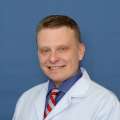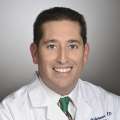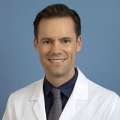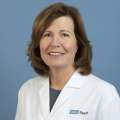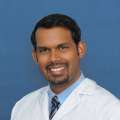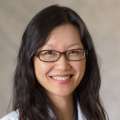Musculoskeletal Oncology Fellowship
Overview
The UCLA Musculoskeletal Oncology fellowship was designed to train the next generation of leaders in the field of orthopaedic oncology. The program provides the fellow with a comprehensive, high-volume experience in a truly multidisciplinary environment in one of the busiest sarcoma centers in the nation. Graduating fellows will have extensive training in the treatment of bone and soft tissue sarcoma, metastatic cancer to bone, benign bone and soft tissue tumors and processes, and metabolic bone diseases. They will also be exposed to advanced techniques in lower extremity reconstruction, microvascular and soft tissue reconstruction, and spine surgery.
The UCLA Sarcoma Program has a rich history that continues today through the structure, mission, and collegiality of group. In 1975 the limb salvage program for extremity sarcomas was started at UCLA by Fred Eilber, surgical oncology, and Todd Grant, orthopaedic surgery. In 1980 Jeff Eckardt, orthopaedic surgery, returned from his fellowship at the Mayo clinic and built the program into the multidisciplinary group that it is today. The group composition was formalized in 1990 to include weekly tumor board meetings that included radiology, pathology, medical oncology, thoracic oncology, pediatric oncology, plastic surgery and social support services along with orthopaedic and surgical oncologists. On an annual basis we evaluate over 1000 patients with sarcoma, and perform approximately 800 sarcoma related surgeries per year. Along with weekly tumor board, the group boasts a robust research infrastructure, which includes an interdisciplinary research seminar and program.
Program Information
The Musculoskeletal Oncology Fellowship is a Musculoskeletal Tumor Society Recognized Fellowship, which will allow graduates to apply for active MSTS Membership. The fellow has attending privileges, and takes an active role in call, case planning and scheduling, and surgical care.
The Tumor Service consists of:
- 3 attending surgeons
- 1 musculoskeletal oncology fellow
- 1 UCLA PGY-5 orthopaedic resident
- 1 Harbor UCLA PGY-4 orthopaedic resident
- 1 UCLA PGY-1 orthopaedic resident
- 1 Nurse Practitioner (clinic)
Faculty
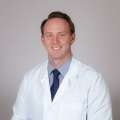
Associated Faculty
Training Institutions
UCLA Santa Monica Medical Center
UCLA Santa Monica Medical Center serves as the cornerstone of UCLA Health's Santa Monica medical campus. The 281-bed, full-service medical center provides the complete continuum of healthcare services, and fully services the majority of our oncology patients. It combines the expertise of an academic medical center with the accessibility of a community hospital to offer patients the best of both medical worlds, and is an orthopaedic-focused medical center designed in-part by former chair and orthopaedic oncologist Jeffrey Eckardt, MD.
UCLA Ronald Reagan Medical Center
Founded in 1955, UCLA medical center became Ronald Regan UCLA Medical Center in 2008. It is ranked the #5 Hospital in the nation by US News and World Reports, and has clinical activities and research centers covering all major specialties of medicine and nursing. It is a level I trauma center for both adults and pediatric patients, and is the primary teaching hospital for the David Geffen School of Medicine at UCLA. The orthopaedic tumor service provides care at Ronald Regan for medically complicated patients and those requiring complex surgery, such as spinopelvic reconstructions.
Orthopaedic Institute for Children
Clinic visits and outpatient surgeries are performed at our pediatric orthopaedic hospital in Downtown Los Angeles. OIC was founding in 1911 as Los Angeles Orthopaedic Hospital, and is now the largest pediatric orthopaedic facility on the West Coast. It now includes the J. Vernon Luck Research Center, Santa Monica Clinic, and International Children’s Program in Calexico. The site houses outpatient suites and an on-site Ambulatory Surgery Center (ASC), which opened in August 2016. EOS imaging is also available here.
Fellowship Goals
The fellowship offers a comprehensive training program that prepares the fellow to pursue an academic career in musculoskeletal oncology. The comprehensive program exposes the fellow to benign and malignant musculoskeletal diseases in both children and adults, preparing them to care for the full spectrum of diseases in musculoskeletal oncology. The fellow will obtain extensive operative and clinical training, and learn the non-operative and operative treatments for orthopaedic oncologic conditions, as well as perioperative management, and the management of complications stemming from treatment. The fellow organizes weekly surgical indications conference, and participates in weekly musculoskeletal tumor board and teaching conference. Musculoskeletal tumor board exemplifies the multidisciplinary care model, and fellows will participate in medical decision making and care coordination. The fellow will also participate in teaching conference, where they will both function as a learner and a teacher for the residents, with a defined subject-based reading curriculum.
Educational Program
Tumor Indications Conference: This conference takes place on Monday morning from 6:45 AM to 7:30 AM. The fellow and residents present post-operative cases from the week prior and pre-operative cases for the upcoming week. Discussion is had regarding indications, outcome of surgery, need and timing of adjuvant therapies, and surgical technique for each case.
Sarcoma Tumor Board: Tumor board meets on a weekly basis Thursday afternoon from 3:30 PM to 5:30 PM. A multidisciplinary approach to each patient is taken, and group recommendations are then relayed to the patient following conference. Tumor board is attended by pathology, diagnostic and interventional radiology, orthopaedic surgery, surgical oncology, medical oncology, pediatric oncology, radiation oncology, and thoracic oncology.
Orthopaedic Surgery Core Curriculum: Presented Wednesday mornings from 6:45 AM to 8:15 AM, two lectures per week for five weeks are given on tumor and tumor-related topics for the orthopaedic surgery residents, and the fellow participates and may give one to two of these lectures. This lecture series takes place on an annual cycle.
Local Courses and Lectures: The fellow is encouraged to attend visiting professor lectures and labs at our institution, locally, and around the country as available. These include the MSTS fellows course and support to attend the industry-led cadaver courses.
Research
One of the unique strengths of our program is the opportunities to pursue both research and training in research. On average, the Sarcoma group publishes over 50 publications per year and produces more than 40 podium presentations at regional, national, and international meetings.
For a fellow interested in developing a skill set to become a leading surgeon-scientist, we offer our fellows enrollment into our Track 2 of our Training Program in Translational Science (TPTS). Track 2 enrollees matriculate with a certified "Fellowship in Translational Science" after taking three 40 minute didactic lectures in each of the following modules.
- Module 1- Grant Preparation and Submission Month: October
- Module 2 -Gender-related Issues in Biomedical Research Month: November
- Module 3 -Therapeutic Discovery and Development Month: December
- Module 4 -Comparative Effectiveness Month: Jan/Feb/Mar
- Module 5 -Modern Imaging Techniques in Clinical Research Month: April
- Module 6 -Biomedical Information: Present and Future Month: May
These on-line lectures are followed by a competency test and have been validated and developed with the UCLA Clinical and Translational Science Institute (CTSI).
Fellows interested in completing clinical research may leverage several unique tools.
- UCLA Endoprosthesis Database. The UCLA endoprosthesis database is a prospectively collected database that has recorded all tumor endoprostheses, diagnoses, patient and surgical variables, and outcomes since 1980. This 40 year effort is one the oldest and most comprehensive tumor databases in the world and now contains more than 1000 unique implants placed at UCLA.
- Clinical Translational Research Center (CTRC). Our division has more than 20 enrolling clinical trials for patients with sarcoma, benign mesenchymal tumors, orthopaedic implant complications, and metastatic bone disease. Given the support of clinical nursing, administration, and logistical assistance, our fellows are able to engage clinical trials without spending the bulk of their year working for approvals.
- Sarcoma Science Monthly Meeting. Our monthly meeting with local PhDs and visiting professors working on organoids, PDOX drug testing, genomics or sarcoma and translational targets is a required meeting for the fellows and a limitless opportunity for productive scientific involvement.
Application Process
Interested candidates should submit their application through San Francisco Match. Applications are accepted annually beginning in September and ending in January. The interview season typically occurs between January and March, ending with match day in April. The Musculoskeletal Oncology fellowship currently has placement for one (1) fellow per academic year. Generally, the current recruitment season is seeking for a fellowship start date of the following academic year (ex: Those matched in April 2023 would begin Summer 2024).
Applications for the San Francisco Match can be found at SF Match - Residency and Fellowship Matching Services.
Application Deadline
The target date to complete requirements for the application is usually in September. Deadline for application submission will be posted by the SF Match.
Interview Dates
2023-2024 Interview dates coming soon!
Policies
For further details, please click here: Policies for Fellowship Program - Orthopaedic Surgery | UCLA Health
Recent Fellows
2021 – Erik Geiger, MD (Rothman)
2022 – Lauren E. Wessel, MD (UCLA)
2023 – Joseph Kendal, MD (University of Calgary)
Contact Information
Please note that applications are only accepted via SF Match.
Alexander B. Christ, MD
Fellowship Program Director
[email protected]
Rebecca G. Reyes, C-TAGME
Director, Education Office
[email protected]


